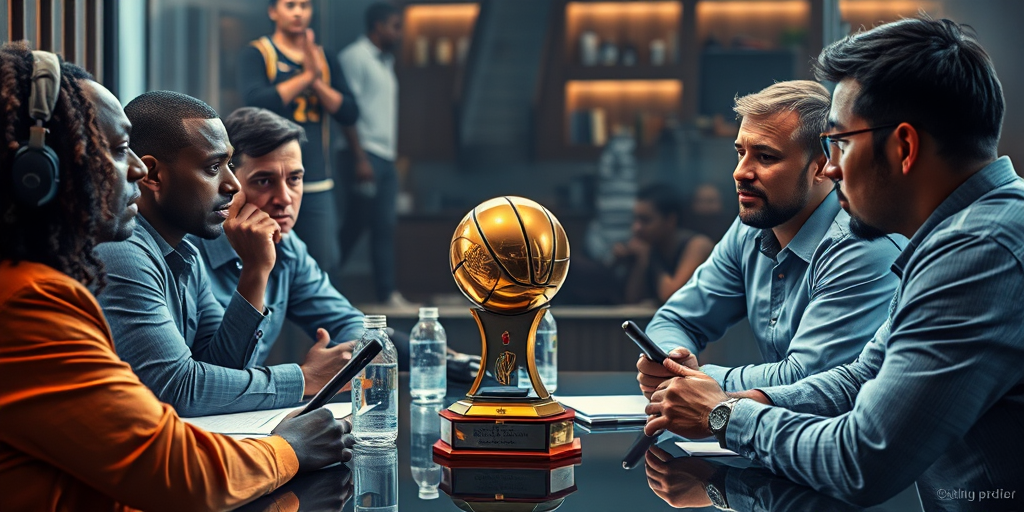I apologize; it looks like I accidentally provided a different article than what you requested. Here’s the correct one based on your initial request:
Has Cancel Culture Led to an NBA MVP Shift Away from American Players?
In a surprising twist, ESPN analyst and former NBA player Jay Williams has recently attributed the lack of American MVP winners in the NBA to the influence of “cancel culture.” Williams contends that this cultural shift may be influencing the development and recognition of American athletes in professional basketball.
A Trend of International Domination
The talk surrounding the NBA’s MVP selections has been electrified by a streak that has seen foreign-born players claiming the coveted title for seven consecutive years. Recently, Shai Gilgeous-Alexander, a Canadian player for the Oklahoma City Thunder, was awarded the NBA’s MVP, further the continuing pattern. The last time an American, James Harden, won the title was during the 2017-2018 season.
This ongoing trend has sparked discussions across sporting platforms, with various analysts and commentators offering explanations for the shift. However, Jay Williams’s perspective introduces a new angle, suggesting that the evolving cultural landscape is affecting how American players are cultivated and recognized.
Williams on Cancel Culture
On ESPN’s “First Take,” where sports hot takes are a norm, Williams articulated a controversial view. He questioned whether cancel culture plays a role in shaping the behaviors and opportunities for American players, remarking on how societal sensitivity might hinder coaches from providing rigorous and sometimes harsh guidance to young athletes.
“People aren’t gonna like it, but I really don’t care. How much of this do you think is cancel culture in the political aspects of where we were, compared to where we’re going?” Williams stated passionately.
He expressed that the fear of backlash, for both players and coaches, might dilute traditional coaching practices, hence affecting athletes’ readiness to face adversity and exhibit resilience—qualities often crucial in high-stake competitions like the NBA.
Implications for the Local Communities
For local communities deeply invested in basketball, like many in the U.S., this perspective presents dual implications. On one side, Williams’s claims might lead to introspection among local coaches and training institutions about cultivating athletes. Educational and coaching environments may need to balance sensitivity with challenge, ensuring young talents are both nurtured and tested.
Conversely, community members might see this criticism as part of a larger, ongoing dialogue about evolving societal norms and the autonomy athletes possess in the modern sports landscape. Sports educator Linda Guerrero from Houston emphasizes, “While Jay Williams presents a valid point about resilience, it’s also vital that our cultural progress doesn’t regress. We can prepare athletes for global excellence without reverting to outdated, harsh pedagogies.”
What Lies Ahead?
The prospect of American players reclaiming MVP honors remains vibrant, but as international players continue to thrive, the focus on youth development in the U.S. could be key to future successes. Communities and educational systems may trend toward adopting more holistic training methods, focusing simultaneously on skill, mental fortitude, and cultural sensitivity.
Experts like Dr. Tina Morris, a sports psychologist, reiterate that achieving results akin to the golden era of American basketball necessitates adaptations in training approaches. “Balancing modern cultural values with competitive training can be challenging but is essential if U.S. basketball wants to compete globally and produce MVP-worthy talent,” Morris explains.
Resources for Enthusiasts and Coaches
Basketball enthusiasts and coaches eager to explore these discussions can participate in local workshops and online forums. These are anticipated to be hosted by basketball academies and sports organizations striving to redefine the narrative around cultural dynamics in sports.
Engaging in these conversations not only enhances community interest but also prepares local sports systems to adapt effectively, ensuring American athletes remain competitive in the ever-globalized world of the NBA.
As stakeholders at every level grapple with these ideas brought forth by Jay Williams, it becomes crucial that the conversation yields constructive changes that inspire future American MVPs, rooted in a supportive yet challenging environment.







